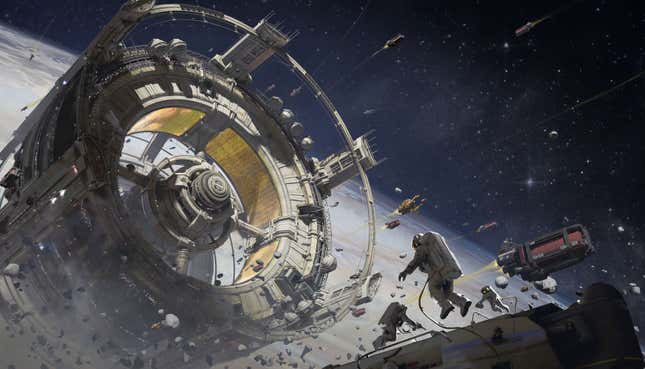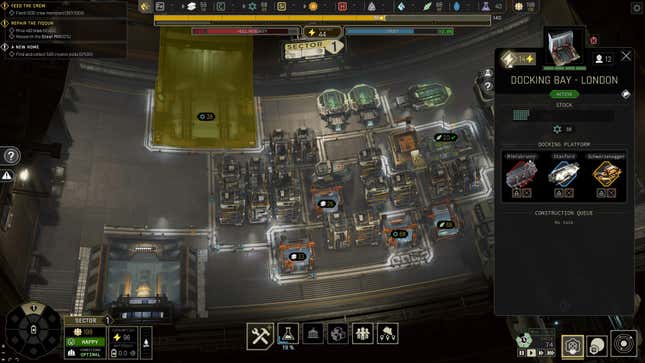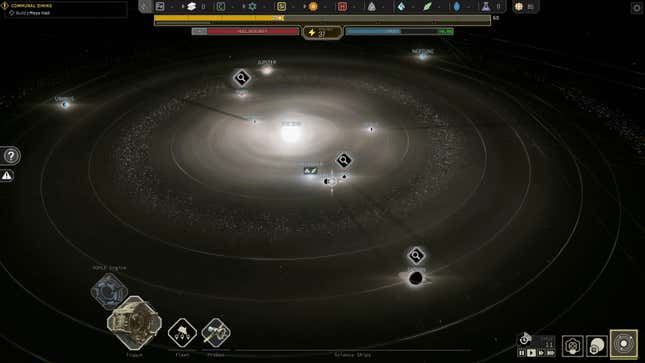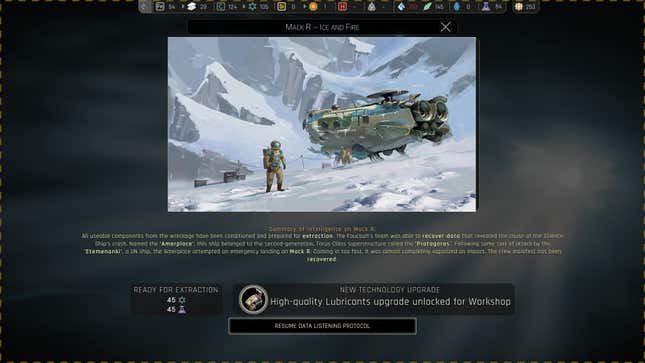
Ixion is the latest release from Bulwark Studios, the developers perhaps best known for the dangerously underrated 40K: Mechanicus. Landing in December alongside some blockbusters it too threatens to fly under a lot of people’s radars, and I’m here today mostly to try and make sure that doesn’t happen.
It’s a space game set—initially, at least—in the not-too-distant future, where mankind has finally developed the technology to travel the stars. For our first big trip we build a huge space station, strap some engines to it, load up a crew, jump to lightspeed and...then everything goes to shit.
I won’t say what happens, but it’s bad, and you soon find yourself adrift and alone in the cosmos. Drawing on everything from Homeworld to Macross to Battlestar Galactica, it’s a story about mankind struggling to survive while clawing out an existence in the coldest, most unforgiving depths of space.

In terms of how it plays, Ixion is a bit of a hybrid. Much of your time is spent inside the station as a city-builder, as you plan and construct the interior to meet the growing needs of your mission and crew. But there’s also a strategic element to Ixion, because your job isn’t just keeping everyone happy and alive inside the station, but managing a fleet of probes and smaller ships outside as well. This involves discovering resources to mine, hauling cargo across space and sending science ships to go on adventures that play out like little RPG quests, offering story tidbits and the chance to make risk/reward choices.
Everything is wound very tightly around its narrative. Ixion is a game bound to its story; if you were expecting or hoping for some kind of free-form sandbox adventure, this ain’t it. The game has no qualms with interrupting or even resetting your progress to fit events, and to its credit that story is an interesting and somewhat unique one (compared to anything you’d compare this to, anyway), with the desperation of Galactica’s flight through space told via the realism of, say, The Expanse.
Yet this is also, by far, the game’s biggest problem. Strategy games that lead you by the hand in service of a setting and story (think Frostpunk and Per Aspera) all suffer from serious pacing issues and difficulty spikes, because the games they’re asking you to play—slow, considered, flexible acts of expression—aren’t compatible with the idea of a linear story that needs to push you forwards and set the agenda. Ixion is no different.

Which is a pity, because the bones of this game are fantastic. The city-builder has some neat twists, like the fact you need to go out in space and actually find new (frozen) crew members, and the way resources have to be mined from asteroids, hauled back then distributed across the station’s various sectors is almost a game in itself.
Ixion’s strategic layer, meanwhile, is also a blast, because though its design and pacing it really nails the feeling that you’re alone and hungry in the limitless expanse of space. Your crew are constantly short on resources, and putting mining on the same screen as your RPG adventures makes what could have been the game’s most boring element into its most immersive.
Which fits the story, I guess, but is also exhausting. In Ixion you’re always in peril, always short of something you need, and it’s hard to get that stuff at the best of times, let alone when you’re dealing with everything from worker strikes to burning factories. A city-builder should at least sometimes be a tranquil experience, because they’re about building and watching things grow; here there were precious few moments I wasn’t feeling incredibly stressed out, and never felt like I got the chance to just enjoy for a day or two the fact that, hey, we were still alive. A sandbox or freeplay mode could have really helped here, but sadly the game doesn’t include either of those things, there’s just the campaign.

The narrative intrusions don’t stop there, either. Ixion’s insistence on reaching into the campaign and dragging you around the universe, instead of doing everything at your own pace, leads to some serious pacing issues. The intro drags on waaaay too long, before dumping you into a deep end that’s too deep, and the game’s division into chapters—you start new ones when you jump to different systems—feel more like interruptions than progressions. They’re also the basis of a very cruel fallback system where, if you find out you’ve built the wrong kind of station to meet a particular challenge, or have too many things go wrong at once and you can’t fix them, you need to restart a whole chapter, which is a tedious and soul-draining exercise that can erase hours of gameplay.
I feel almost bad for spending so much time here talking about things that bum me out, because there really is so much to love and admire here. Ixion’s art and writing are surprisingly slick for a game of this profile, with fantastic designs and a story that had me eager to unravel its mysteries from the opening minutes. It also looks and sounds incredible; the city-building sections let you zoom right in and see individual workers doing their thing, while the single best part of the whole game is watching a ship inch across the stellar map from the strategic view then zooming into the station to see it enter a docking bay in real-time. Which doesn’t sound like much, but it’s very cool to watch!
Ixion is a game whose parts are greater than their sum. The city-building is fun, the strategic management is handled really well and there’s a gripping story to be told about mankind’s most desperate hours. It’s just a shame the latter got a bit too heavy-handed with the former.